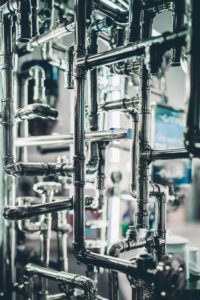Pipe corrosion occurs in a variety of ways. When allowed to progress continually, corrosion leads to substantial issues with your plumbing system. Understanding how to stop pipes from corroding in the first place can go a long way toward improving your plumbing system, preventing damage, and ensuring that your pipes remain in good condition. Here are a few top tips for stopping pipe corrosion in your property.
What is Pipe Corrosion?
In order to effectively stop pipe corrosion, it is important to first understand what pipe corrosion is. Essentially, pipe corrosion is the outcome when the material that comprises the pipes breaks down. This often results in the appearance of pipes that are both eaten away or worn out. Pipe corrosion commonly occurs over time, particularly in older buildings or buildings that have specific types of pipes. If you notice the signs of pipe corrosion in your property, it is useful to ensure that you have it repaired in your plumbing system.
Causes of Pipe Corrosion
Pipe corrosion is common because there are multiple things that lead to the corrosion of pipes. Sometimes, the connections between different pipe materials lead to corrosion of pipes. These various materials don’t always interact appropriately with each other, which can cause corrosion to arise. Oxygen is often one of the biggest culprits of pipe corrosion. When oxygen in water reacts with the metal material of the pipes, it is common for pipe corrosion to arise. Minerals that occur naturally in your regular water supply may also have a reaction to the pipes, which can lead to corrosion. There are many additional issues that can lead to pipe corrosion, though these are generally the most common.
Signs of Pipe Corrosion
Familiarizing yourself with the signs of pipe corrosion will help you to identify when issues are present with your plumbing system. Signs of rust or stains in your sinks or toilet bowls are often an indication of corrosion in your pipes. Weak water pressure is another sign that your plumbing system isn’t working quite as it is intended to. Excessive clogs often indicate that the pipes aren’t working correctly. Pay attention to the water that comes out of your plumbing system. When water is somewhat discolored, usually an orange tinge, it is likely that the pipes have become corroded. In addition, corroded pipes may produce water that has a rather metallic odor or taste.
Tips for Stopping Pipe Corrosion
Stopping pipe corrosion in the early stages can help to protect your plumbing system. When you allow corrosion to escalate, it can lead to additional damage to the plumbing. It is often most beneficial to stop pipe corrosion early on to prevent an escalation of damage and ensure that your plumbing system remains in the best possible condition. Here are a few tips for stopping pipe corrosion on your property.
Test your Water
The quality of your water often has a substantial impact on the condition of your pipes. In order to determine if the water is capable of damaging your pipes, you may want to obtain a kit that is specifically designed to test your water. This will help you to identify the amount and type of minerals that are present in your water. If there are minerals that react negatively to the pipes of your building, you will want to take steps to improve the quality of the water.
Install a Water Softener
Using a water softener can go a long way toward keeping your pipes clear and free of corrosion. This tool helps to pull harmful minerals from the water that you drink. Not only will this help to protect your plumbing system and your pipes, but it will also ensure that soaps and shampoos are more effective. Hard water can dry out your hair, damage your pipes, and lead to many other types of damage.
Check your Pipes
 It is important to check the pipes that you have in your home. For one thing, you will want to inspect them for the possibility of damage. Another factor is to check the materials that your pipes are comprised of. Certain materials are more likely to corrode than other materials. This can also help you to determine what metal pipes will react to other minerals and materials.
It is important to check the pipes that you have in your home. For one thing, you will want to inspect them for the possibility of damage. Another factor is to check the materials that your pipes are comprised of. Certain materials are more likely to corrode than other materials. This can also help you to determine what metal pipes will react to other minerals and materials.
Water Pressure
When your system uses extremely high levels of water pressure, it is likely that the water pressure can damage the pipes. Higher amounts of pressure tend to put higher levels of stress on the pipes of your property. It is particularly beneficial to ensure that your water pressure isn’t too high in order to prevent wear and damage to the pipes of your plumbing system.
Regular Drain Cleaning
It is important to have your drains cleaned on a regular basis. Clogs ultimately put a substantial amount of pressure on your pipes. When they are allowed to accumulate, it can lead to an escalated amount of damage to your pipes. Having your drains cleaned on a regular basis helps to have these clogs effectively removed, as well as prevents corrosion from occurring.
Consider Re-piping
It is important to consider whether re-piping is the best solution for your property and specific situation. Re-piping tends to be extremely beneficial for older homes that have consistent problems with the plumbing system. When the plumbing system has sustained a significant amount of damage, you may want to obtain re-piping services for your property.
Stopping pipe corrosion is an important way to protect your plumbing system and prevent a substantial amount of damage. We offer a large array of services to help protect, maintain, or repair the plumbing system of your property. Keeping the pipes in good condition is an important way to prevent an extreme amount of damage from occurring after a malfunction with the plumbing system. Here at S & B Plumbing, we strive to ensure the best services possible for your plumbing system. To learn more about the services that we offer, as well as how to keep your pipes in great condition, contact our experts today!
